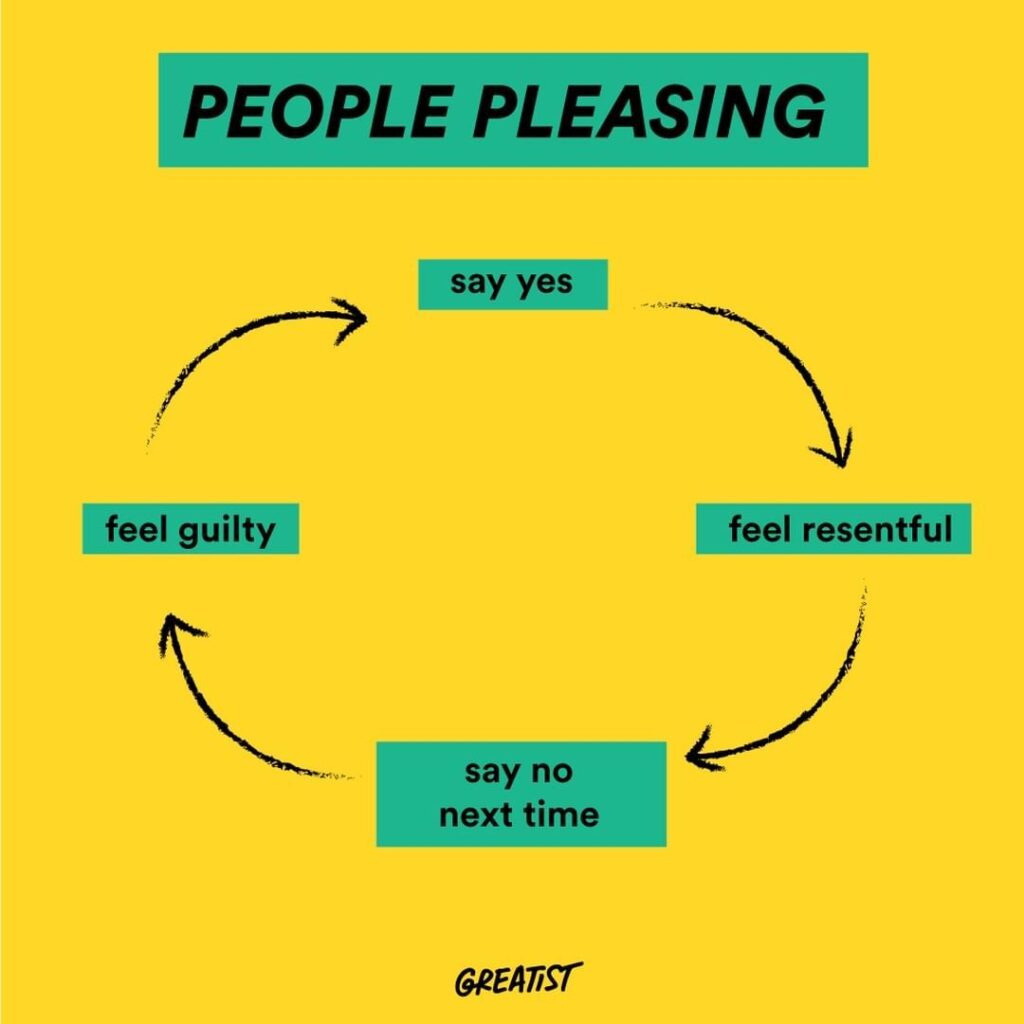Have you gone through life pleasing people around you? Is it hard for you to say a polite no, and instead you make life hard on yourself to make others happy?
Have you spent your life being a Nutella chocolate bar for your loved ones? If you answered yes to any one of these questions, you are a people pleaser and I am here to teach you practices to break people pleasing cycle PLEASANTLY! GET IT?

Image Source: The Washington Post
Do you also struggle to say no to absolutely anything, anyone asks you for? If the answer is yes, join the club!
Once you get entrapped in the people pleasing cycle, it may seem impossible to get rid of.
But my experience suggests otherwise. It is completely possible to follow practices to break people pleasing cycle, and this blog is going to be your guide on how to say no.
Saying ‘no’ did not come easy to me. It still doesn’t. This weakness has led me to make the worst decisions of my life, take on the worst projects, and work with the worst clients.
For as long as I can remember, no was not a part of my vocabulary.
“Can you help me with my assignment?” (and write all of it)
”Sure!”
“Can you cook dinner tonight?” (while I go relax in my room)
“Ok!”
“Can you reduce your budget for the project?” (which you have already done three times and I just don’t want to pay you anything)
The struggle is real! And it mostly comes from a positive, self-damaging perspective of going overboard to understand others’ needs instead of your own.
Once this disease, and yes, it is a disease and not a bad habit, takes a toll on someone, they find themselves saying yes to places and activities that cause them nightmares.
It would be a white lie if I told you that I have recovered from the disease. There are days when I still struggle to find the word no. Whether because of the circumstances, or feelings towards the person asking for a favor, saying no can be tough sometimes. One should be able to identify exceptional situations and prioritize themselves over others instead of getting stuck in the loop. Remember! You are not alone in this. The internet is full of articles and information on practices to break the people pleasing cycle and this blog is one of them.
People Pleasing Trauma – Why Do People Struggle To Say No?
People-pleasing trauma refers to the behavioral patterns that develop as a response to trauma, often characterized by an overwhelming desire to satisfy others at the expense of one’s own needs and desires.
This phenomenon is commonly linked to the “fawning” response, which is one of the four recognized trauma responses (fight, flight, freeze, and fawn).
Individuals who exhibit people-pleasing behaviors may have experienced childhood trauma or ongoing relational trauma that taught them to prioritize others’ feelings over their own in order to avoid conflict or gain approval.
People-pleasing can manifest in various ways, such as difficulty saying no, neglecting personal boundaries, and constantly seeking validation from others.
This behavior often stems from a deep-rooted fear of rejection or abandonment, leading individuals to abandon their own needs to maintain harmony in relationships.
Over time, this can result in feelings of resentment, low self-esteem, and emotional exhaustion.
There could be a million reasons behind the struggle, but you already know that. Let’s dive into what the reasons are that people cannot practice breaking the people pleasing cycle.
- We are afraid of being considered incompetent. People who struggle to say no to someone are mainly afraid of the judgment they might receive. They fear that the love and care need to be earned and if they don’t say ‘yes’, they might end up losing that acceptance from others. (1)
- We are wired to please others. People pleasing is a trait often instilled in individuals from their childhood. When a child comes 1st in his class, he is appreciated and applauded. However, when the same kid gets average grades, he is encouraged with faded applause. (2)
- We feel guilty if we say no to something. We were hardly ever prepared to deal with guilt that comes with saying no, even if it is for a genuine reason. Feelings of discomfort and doubtful are often associated with the guilt of saying no but that should not affect our decisions. (3)
- We fear hurting our relationships. Feelings emerge from our preperceived concepts. These feelings control our actions. Therefore, when a loved one asks for a favor we often blurt out yes, fearing we might hurt their feelings, ultimately affecting our relationship. (1)
- We were not allowed to say no. I read a very beautiful quote that was something like, “We are taught to walk and talk and then asked to shut up and go away for the rest of our lives.” (4)
After all this, how can we expect someone to break people’s pleasing cycle without an indefinite struggle? And first things first! Give yourself some love too with these 99 Self-Love Journal Prompts.

Image Source: Greatist
Why Is It Important To Stop People Pleasing Cycle?
Do you remember the last time you were taught to say no to someone or something apart from sex education classes? Did you ever receive a class or were lectured by your parents on learning to say no to yourself, your mental health, your privacy, or your professional life?
‘No’ is not just a word, it’s a weapon, a weapon of empowerment. It lets you build boundaries and keeps your physical and mental health in check. And not just that, you save yourself from wasting your time and energy on something that only brings disturbance in return. Trust me! Learning to say no brings a transformative journey in your life. (4)
As Tim Ferriss said, “Half of the world’s trouble can be traced back to saying yes too quickly and not saying no soon enough.” Own who you are with these 6 Important Steps and you will get there.
Practices To Break The People Pleasing Cycle – People Pleasing Coping Mechanism
Over the years, I have learned a few tactics that can be employed to break the people pleasing cycle. Here is my ultimate guide that contains all the practices to break people pleasing cycle. There is a quote, that always reminds me the importance of saying no, and it goes like,
“The art of leadership is saying no, and not saying yes. It is very easy to say yes.”
Tom Friel
- Just say no directly and politely.
Being direct is always the best solution, but it does not involve being rude by using strict and harsh language. Simply let the person know that it is not in your capacity for the time being or forever.
- Take your time.
To avoid having to react rather than respond, take your time. Some situations, like being requested by a close friend to babysit for an hour, are delicate and put you on a spot. Taking time means you are trying at your end.
- Say no with gratitude.
Saying no can make you a jerk sometimes. In such situations, lead with gratitude. For example, your coworker invited you for lunch on a lonely weekend. But you were looking for it. Just say how grateful you are but can’t make it.
- Identify Your Triggers
Understanding the situations or people that typically trigger your people-pleasing behaviours is crucial. Are you more likely to agree to something out of fear of rejection, or do you feel obligated to help others even when it’s inconvenient? Recognizing your triggers will empower you to respond more consciously.
- Practice Self-Compassion
Be kind to yourself. It’s okay to say no without feeling guilty or selfish. Remember that setting boundaries is a healthy way to protect your well-being. Treat yourself with the same compassion and understanding you would offer a friend in a similar situation.
- Develop Assertiveness Skills
Assertiveness is the ability to express your needs and desires clearly and respectfully. Practise expressing yourself honestly without being aggressive or passive-aggressive. Remember, it’s perfectly acceptable to say “no” or “I’m not comfortable with that.”
- Prioritise Your Own Needs
Your needs are just as important as anyone else’s. Make a conscious effort to prioritise your own well-being. This might involve scheduling time for activities you enjoy, getting enough rest, or setting aside time for self-care.
- Visualise Saying No
Visualising yourself saying “no” in challenging situations can help you feel more prepared and confident. Imagine yourself calmly and assertively expressing your boundaries. This mental practice can boost your self-belief.
- Learn to Delegate
If you find yourself overwhelmed with responsibilities, don’t be afraid to delegate tasks to others. This can lighten your load and help you focus on what’s truly important.
- Practice Gratitude
Expressing gratitude can help shift your mindset and reduce feelings of resentment. Acknowledge the positive aspects of your relationships and the support you receive from others.
- Seek Support
If you’re struggling to break the people-pleasing cycle, consider seeking support from a therapist or counselor. They can provide valuable guidance and tools to help you develop healthier coping mechanisms.
102 Polite Ways To Say No And Stop People Pleasing Manipulation
Direct and Honest Responses
- Not at this time.
- I’m sorry, but I can’t do that.
- I’m afraid I’m unable to accommodate that request.
- Perhaps another day.
- I’m not available for that.
- I’m not comfortable with that.
- Unfortunately, not possible.
- Regrettably, no.
- I’m going to have to decline.
- I’m afraid I’m already committed.
- I’m not able to take on any more at the moment.
- It’s not feasible.
- I’m not the right person for that job.
- I’m not interested in that.
- I’m not up for that.
Understanding and Empathetic Responses
- I sympathise, but I’m unable to assist at this time.
- I understand, but my schedule is full.
- I see your point, but I’m already committed.
- I appreciate your request, but I’m not the right person for that.
- While I’d love to, my priorities lie elsewhere.
- I understand you’re in a pinch, but I’m not the right person for that.
- I appreciate your understanding.
- I’m so sorry to hear that, but I’m not able to assist.
- I’m sorry, but I’m not available at this time.
- I wish I could, but I’m not able to at this time.
- I sympathise with your situation, but I’m not able to help.
- I understand why you’re asking, but I’m not the right person for the job.
- I wish I could, but my hands are tied.
- I’m sorry, but I’m not able to fulfil your request.
- I’m sorry, but I’m not the best person to ask about that.
- It’s not something I’m able to do at the moment.
- I’m not the right person for that task.
- It’s not something I’m interested in.
- It’s not something I’m up for.
- It’s not something I’m able to accommodate.
- I understand, but it’s not possible for me.
- I see where you’re coming from, but…
- I appreciate your asking, but…
- I’m sorry, but I’m not able to.
- I wish I could, but it’s not in my best interest.
Polite and Considerate Responses
- My hands are tied at the moment.
- I’m flattered you thought of me, but I’m going to have to decline.
- Thank you for the invitation, but I’m going to have to pass.
- My schedule is full for the foreseeable future.
- I’m grateful for your trust, but I’m going to have to decline.
- I’m so grateful for your trust, but I’m going to have to decline.
- It’s not something I’m comfortable with.
- It’s not something I’m good at.
- I’m so sorry, but I’m not able to do that.
- I’m sorry, but I’m not able to accommodate your request.
- My priorities lie elsewhere right now.
- I’m sorry, but I’m not able to help you with that.
- My plate is full, but I’ll keep you in mind for future opportunities.
- It’s not in my best interest to take on this task.
- I’m sorry, but I’m not able to meet your needs.
- It’s not something I’m interested in.
- It’s not something I’m available for.
- It’s not something I’m able to do.
- I’m sorry, but I’m not able to fulfil your request.
- I’m sorry, but I’m not able to assist you with that.
Gentle and Humble Responses
- I’m not quite up to that task.
- I’m afraid my plate is full at the moment.
- Beyond my capabilities at this time.
- I’m afraid my schedule is full.
- Outside my expertise, but I can recommend someone who might be able to help.
- Not my area of strength, but I’m happy to learn more about it.
- I’m flattered you asked, but I’m not the best person for that job.
- I’m not the right person for that.
- I’m not able to assist at this time.
- Not my cup of tea, but I’m sure you’ll find someone who is.
- Not something I’m comfortable doing at the moment, but I appreciate your asking.
- I’m not sure if I’m the best person to ask.
- It’s not something I’m particularly good at.
- It’s not something I’m very experienced with.
- I’m not really qualified to do that.
- I’m not an expert in that area.
- It’s not something I’m confident in doing.
- It’s not something I’m particularly interested in.
- It’s not something I’m able to do at the moment.
- I’m not sure if I can do that justice.
- I’m not sure if I can do that well.
Grateful and Sympathetic Responses
- I’m so sorry to hear that, but I’m not able to assist.
- I’m sorry, but I’m not able to assist you at this time.
- Thank you for understanding. I’m sorry I can’t be of more help.
- I’m so sorry, but I’m not able to do that.
- I’m so grateful for your trust, but I’m going to have to decline.
- I appreciate your consideration. I wish I could, but my schedule is full.
- I’m grateful for your trust, but I’m going to have to decline.
- I’m sorry, but I’m not the right person for the job.
- I’m sorry, but I’m not able to fulfil your request.
- I’m flattered you thought of me, but I’m going to have to decline.
- I’m sorry, but I’m not able to help you at this time.
- I’m sorry, but I’m not able to fulfil your request.
- I’m sorry to disappoint you. I’m sure you’ll find someone who can assist you.
- I wish I could, but my priorities lie elsewhere right now.
- I’m sorry, but I’m not able to accommodate your request.
- I’m sorry, but I’m not able to assist you with that.
- I’m sorry, but I’m not able to do that for you.
- I’m flattered you thought of me. I’m sorry I can’t help, but I’m sure you’ll find someone who can.
- I’m sorry, but I’m not able to accommodate your request.
- I’m sorry, but I’m not able to do that for you.
- I’m so grateful for your consideration, but I’m going to have to pass.
The most important thing is to not upset your peace of mind by chasing after other people’s happiness while overlooking your own.






